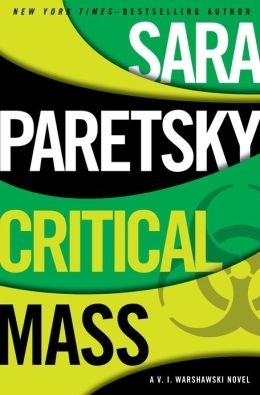
Critical Mass
By Sara Paretsky
(Putnam)
There must be something inspiring about dating a classical musician: Since private investigator V.I. Warshawski took up with double bassist Jake Thibaut in 2009’s “Hardball,” her creator, author Sara Paretsky, seems to have renewed creative energy, evident in pages that almost seem to turn themselves.
The considerable action of “Critical Mass” (the title refers to nuclear physics, not getting together a crowd of reviewers) is set off when Warshawski is asked by her friend, Dr. Lotty Herschel, to find Judy Binder, the daughter of Kathe, with whom Lotty grew up in pre-World War II Vienna, and Judy’s son, Martin.
That assignment takes Warshawski from her North Side Chicago neighborhood to a ruined downstate meth house in a first chapter that contains some of Paretsky’s tautest writing ever. The book’s narrative also moves between wartime Vienna and present-day Chicago, the misery of the Jewish ghetto and the luxuries of North Shore privilege.
It’s a tale of intertwined generations. The miserable Kathe was the illegitimate daughter of two nuclear physicists, sent from Vienna to Britain with Lotty and other Jewish children in the Kindertransports in 1939. Her mother, Martina, disappeared without a trace after a stint as slave labor. Kathe’s daughter, Judy, is a drug addict, but Judy’s son, Martin, takes after Martina, a scientific genius. His employer, a computer magnate, thinks he’s trying to sell company secrets.
Warshawski tracks down Judy, but Martin has “gone dark”; finding him takes most of the rest of the book. She tangles with drug dealers and thugs, most notably a Bill of Rights-trampling pair from the Department of Homeland Security, who wreck her office and apartment and shoot at her, citing “an investigation connected to our national security” and “certain warrantless rights” to justify anything they care to do. Soon after, V.I. goes dark herself.
There’s plenty of action, along with Paretsky’s usual dry humor. “Just at the time that John von Neumann was bringing the first big computer online at Princeton, Edward Breen came up with a relativistic model for the matrix that altered the mechanics of core memory. I read that last sentence three times, and decided that English might not actually be my first language.”
With entombments, solved mysteries, loose ends neatly tied, good writing and a little bit of love, “Critical Mass” is a thoroughly satisfying read. (MCT)





![[Herald Interview] 'Trump will use tariffs as first line of defense for American manufacturing'](http://res.heraldm.com/phpwas/restmb_idxmake.php?idx=644&simg=/content/image/2024/11/26/20241126050017_0.jpg)

![[Herald Review] 'Gangnam B-Side' combines social realism with masterful suspense, performance](http://res.heraldm.com/phpwas/restmb_idxmake.php?idx=644&simg=/content/image/2024/11/25/20241125050072_0.jpg)
![[Health and care] Getting cancer young: Why cancer isn’t just an older person’s battle](http://res.heraldm.com/phpwas/restmb_idxmake.php?idx=644&simg=/content/image/2024/11/26/20241126050043_0.jpg)